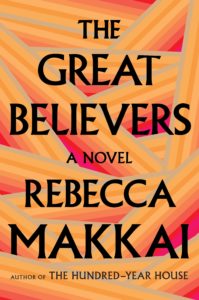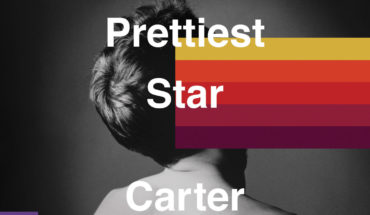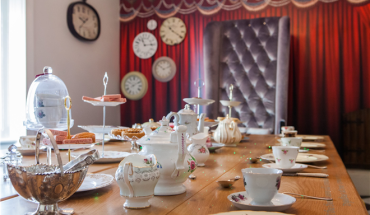 I’ve been a Rebecca Makkai fan for a while. Her first two novels, The Borrower (Viking, 2011) and The Hundred Year House (Viking, 2014) had me. Then she read an early draft of my forthcoming novel, A Bend in the Stars (Grand Central, 2019), and gave extraordinary editorial comments—cementing my fandom. So when her newest novel was published, The Great Believers (Viking, 2018) I jumped on it—and it did not disappoint. It is superb. Already it’s been heaped with praise and starred reviews, and for good reason. It is a page turning, heart break of a novel that lays bear the devastating impact of the AIDS epidemic at its height and in its aftermath.
I’ve been a Rebecca Makkai fan for a while. Her first two novels, The Borrower (Viking, 2011) and The Hundred Year House (Viking, 2014) had me. Then she read an early draft of my forthcoming novel, A Bend in the Stars (Grand Central, 2019), and gave extraordinary editorial comments—cementing my fandom. So when her newest novel was published, The Great Believers (Viking, 2018) I jumped on it—and it did not disappoint. It is superb. Already it’s been heaped with praise and starred reviews, and for good reason. It is a page turning, heart break of a novel that lays bear the devastating impact of the AIDS epidemic at its height and in its aftermath.
At its core are two intertwined stories. The first is set in Chicago and focuses on Yale and his live-in lover, Charlie, in the second half of the ‘80s. The second is set in Paris and focuses on Fiona thirty years later, a woman still dealing with the havoc AIDS wreaked, killing her brother and most of their shared friends. Both stories expertly re-create the fear, profound sadness and prejudice that roiled the gay community then and still lingers today.
While Makkai is an expert at recreating this time period, and its emotions, an additional pull for me was the fact that this past summer I lost a childhood friend, Michael Friedman, to AIDS. He was someone I had looked up to since the third grade. He hadn’t known he was infected for long and I’ll admit my initial reaction was surprise. In 2018? So fast? Michael? And this was likely one of Makkai’s main points: Have we really come so far since the ‘80s, not in terms of medical advances, but in terms of our awareness?
Read this book. Yes, it will break your heart but we all need that once in a while. We at Dead Darlings were thrilled when she agreed to this interview, so let’s get to the good stuff:
Most of our readers are writers—and we want to know: Rebecca, are you an outliner or a pantser?
I really don’t think it’s an either-or proposition. I tend to brainstorm a bit and then write my way into the story, trying to get at least a quarter of the way in just on the momentum of the initial idea. Then, when I’m losing steam anyway, I’ll stop and outline as far as I can see. It would be pointless to try to outline before I’d even met my characters.
How long did it take you to write The Great Believers?
It depends what you mean by “write.” I usually have at least a six-month marinating phase where I just think about a book. I’m in this right now with my next one, and it feels like I’m just walking around and around a boulder, trying to figure out the best way to pick it up. And then there’s the actual writing, and then there’s the phase when it’s done but you work in frantic spurts on copyedits or final proofs, and sometimes it does still feel like you’re writing then, living in the world of the book and changing things with the tweak of a comma. So all told, I could say five years. But the actual writing time might have been more like three and a half.
How often did you consult your research v. write from what you learned and imagined?
I did an enormous amount of research for this book—I absolutely had to—and of course I ended up with far more than I could possibly use. I research in layers, and I always encourage my students to do the same. By which I mean: In this case, I did some lay-of-the-land research, some basic reading, and then began to write, knowing I’d be getting a lot wrong that I’d have to go back and fix later. As questions came up, I’d either leave a blank (they’ll go to a bar, but I’ll figure out what bar it is later) or, when I couldn’t proceed without knowing more (what was it like to get tested for HIV in 1986?), I’d research. Meanwhile, I was conducting interviews (with survivors, doctors, activists, journalists, nurses, historians, etc.) whenever people were available to talk. I see a lot of students fall into the trap of trying to do all their research first, before they even know what they’re looking for. When you go into a time and place with no specific agenda, it all seems vitally important, and you can end up spending three or four years in a state of what I’ve heard other writers call “research rapture.” And then you have an overwhelming amount of information, so much that you can’t possibly pick a starting point. So much that it becomes very hard to jettison any of the information you worked so hard for, and your book, if you ever do get around to writing it, reads like a tourist guide rather than a novel.
Our readers LOVE this one. What was the biggest editorial change you made while editing The Great Believers?
The Fiona sections weren’t there at first (I added them after I’d written about 150 pages of the way in with just Yale’s narrative) but I feel like I’ve talked about this ad nauseam, and if people are very curious, they can find a lot of other interviews where I discuss it. Besides, that was a change I made while I was writing, not while I was editing.
I’ll go instead with the second biggest change, which is that in Nora’s story, Ranko Novak wasn’t originally there. It was going to be Modigliani with whom she’d had a major affair, and she was all wrapped up in the drama surrounding his death and the suicide of his common-law wife. Again, this was a change that came about as I was still writing, but I changed it fairly late in the draft and then had to go back and do a lot of rewriting. It became important to me that Nora’s great lost love was an unknown, and it was also important that he fought in the war—two things that weren’t true of Modigliani. I have a bit of a crush on Modigliani, so it was hard to make the change, but he’s still in the book in a different role.
Moving along to content. You wrote a scene in which two characters joke about the ‘sex police.’ The term is thrown out in an off-handed way, but Yale seems to realize the words have more weight than that. They stayed with me, too. How did you come up with the idea of a ‘sex police’ and what did it mean to you when you included it?
They’re talking there about not wanting to run around telling on everyone for their indiscretions. (Which, in this case, has led to some problems.) Monogamy was absolutely not the norm in the gay community at this point, and the strictures of monogamy were often seen to go hand-in-hand with the judgments and rules of straight culture—something these characters largely do not want to participate in. Of course we do, as a society and as individuals, have this strange tendency to try to police other people’s sexuality and their sex lives. This group of friends was feeling that acutely, and so it felt right to me that this would be Julian’s defense for not telling Yale about someone else’s indiscretions. There was so much fear right then, with the invasion of AIDS, of turning into the very people you’d been fighting to get free of your whole life.
Julian was a character I loved to hate. He didn’t appear in many scenes and yet he was present in the background in large chunks – and, I think, you wrote him into a few of the most important conversations. For example, at the end, Julian says, “If we could just be on earth at the same place and same time as everyone we loved, if we could be born together and die together, it would be so simple. . . But listen: You two are on the planet at the same time. You’re in the same place now. That’s a miracle.” Why does Julian, and not Yale, Charlie or even Fiona have such profound wisdom?
I’m going to give a major spoiler here, so I beg anyone who intends to read the book but hasn’t finished it yet to skip this answer. And I’m going to put a few extra words here as a buffer until I’m pretty sure those people are gone, blah blah, okay: Julian is the only one who gets to grow up. At the end, we’re listening to a man who’s around 55 years old, an actual grownup. Fiona survives too, of course, but she’s stunted in many ways. As with so many people who experience trauma, she’s stuck at the age she was when the trauma occurred. Julian’s certainly been through trauma too, but the fact that he’s managed to grow as much as he has is a big wakeup call for Fiona. Like many of the men I know who did live through that time and self-medicated with alcohol and drugs, Julian is now sober. There’s necessarily going to be a lot of serious reckoning that goes into a transformation like that. To me, Julian was always pretty smart, actually, as actors do have to be; he enjoyed playing dumb when he was younger, though. Yale tells Fiona as much. Yale is one of the only ones to be on to him.
One more content question. I was frustrated with Yale for the fact that he didn’t show more rage when he discovered he’d been exposed to AIDS. And then for him inventing a virginal story for Roman. Why wasn’t Yale angrier? Or more cautious?
To answer the first question: Yale is a very gentle and cautious person, and he’s always had a hard time sticking up for himself. On top of this, in the moment when he’s confronted with his own possible exposure, the one person he could blame is, himself, dying. There was so much toxic blame surrounding AIDS at this point (well, not just at this point) that people in the gay community went out of their way to avoid participating in that cycle, at least when they could help it. Yale is furious at Charlie, but even when he attacks him as much as he finally does, it comes back to haunt him. As for Roman: There’s a lot of wishful thinking there… Plus, we do make so many assumptions about people and then forget that these are assumptions rather than facts. It’s something we do all the time. Realistically, people do make assumptions about the health of sexual partners based on appearance and perceived behavior. Yale makes mistakes, and it was important to me that he be flawed. It was also important to me that he not be the perfect victim, the guy who does every single thing right and still gets sick. That would be too easy, I think, and too manipulative, and it could ring false.
Finally, let’s get personal. What are you reading now? What books do you recommend?
I’m reading Invitation to a Bonfire, by Adrienne Celt, and really enjoying it; it’s fun, which is exactly what I needed. And I’m listening to Manhattan Beach, by Jennifer Egan and loving that too. She’s doing something effortlessly authoritative with the narration. I’ve been cranky about books lately, so to be in the middle of two things I enjoy is a delight.
About Rebecca Makkai: Rebecca is the Chicago-based author of the novels The Great Believers, The Hundred-Year House, and The Borrower, as well as the short story collection Music for Wartime. Her short fiction won a 2017 Pushcart Prize, and was chosen for The Best American Short Stories for four consecutive years (2008-2011). The recipient of a 2014 NEA fellowship, Makkai is on the MFA faculties of Sierra Nevada College and Northwestern University, and she is the Artistic Director of StoryStudio Chicago



